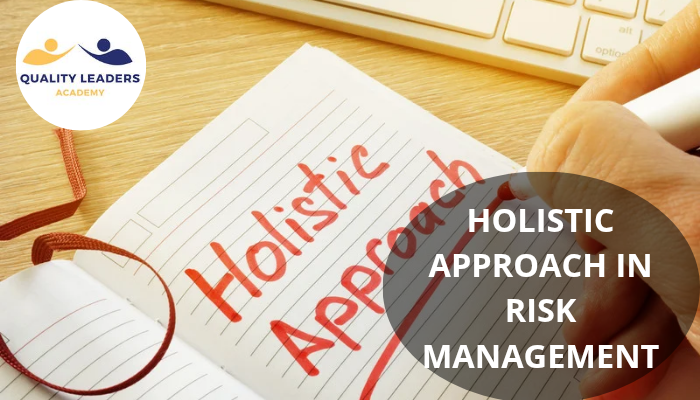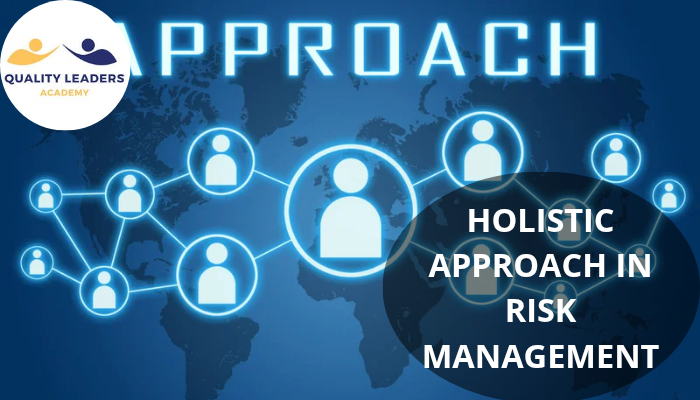In modern healthcare, risk management is more than identifying and mitigating hazards, it's about creating a resilient system that continuously learns and adapts. A holistic approach in risk management acknowledges the complexity of clinical environments and integrates every part of the organization into the risk strategy. This approach enhances safety, increases efficiency, and leads to better patient outcomes.
WHAT IS A HOLISTIC APPROACH IN RISK MANAGEMENT?

A holistic risk management strategy considers all internal and external factors affecting an organization. As highlighted by ScienceDirect, holistic risk management is not a standalone function but an integrated discipline that works within existing organizational structures. It considers clinical, operational, financial, and strategic risks, ensuring nothing is overlooked.
Rather than compartmentalizing risk into departments, the holistic model ensures that communication, accountability, and risk awareness permeate the entire organization. This encourages collaboration across teams and enables early identification and mitigation of potential issues.
WHY IS RISK MANAGEMENT IN HEALTHCARE IMPORTANT?
In healthcare, unmanaged risks can have severe consequences, from patient harm to financial loss and reputational damage. Risk management is essential for maintaining compliance with regulatory standards and ensuring patient safety.
As stated by Radar Healthcare, proactive risk management enables healthcare providers to identify the underlying causes of incidents. Rather than merely responding to failures, they can put preventative measures in place to avoid them entirely. A holistic perspective makes this prevention more effective by breaking down silos and ensuring shared responsibility.
TYPES OF RISKS IN HEALTHCARE
Healthcare organizations face a variety of risks that span several domains. These include:
- Clinical risks: Medical errors, misdiagnoses, or surgical complications.
- Operational risks: Staffing shortages, IT system failures, or process inefficiencies.
- Financial risks: Budget overruns, billing errors, or insurance disputes.
- Legal and regulatory risks: Non-compliance with health standards or privacy breaches.
- Strategic risks: Failure to adapt to market trends or policy changes.
A holistic risk management plan ensures that these diverse risks are addressed in a unified framework, instead of being tackled in isolation.
WHAT ARE THE 3 AREAS OF RISK MANAGEMENT IN HEALTHCARE?
Healthcare risk management typically involves three key areas:
Clinical Risk Management:
Focuses on patient safety and quality of care. It involves identifying clinical hazards, analyzing incidents, and implementing safety protocols.
Operational Risk Management:
Includes all risks related to organizational processes, such as scheduling, documentation, equipment maintenance, and workforce management.
Enterprise or Strategic Risk Management:
Covers external risks and broader strategic issues like mergers, healthcare reforms, or emerging technologies.
These areas must not function independently. A holistic strategy links them together, allowing for comprehensive decision-making that benefits the entire organization.
HOLISTIC APPROACH IN RISK MANAGEMENT IN HEALTHCARE EXAMPLES
Let’s take the example of implementing a new Electronic Health Record (EHR) system in a hospital. Traditionally, this might be seen as an IT project, with minimal involvement from clinical teams. However, a holistic approach in risk management in healthcare ensures that:
- Clinical staff are involved from the planning stage to identify workflow risks.
- Compliance teams verify that privacy standards are met.
- Finance departments assess budget implications.
- Training plans are created to ensure user adoption.
This cross-functional collaboration reduces rollout risks, improves staff satisfaction, and enhances patient care.
RISK MANAGEMENT IN HEALTHCARE EXAMPLES
Numerous real-life cases highlight the effectiveness of holistic risk management:
Medication Safety Programs:
Hospitals using a system-wide approach to track prescription errors across departments have significantly reduced adverse drug events.
COVID-19 Response:
During the pandemic, health systems that integrated clinical operations, supply chain management, and infection control under one risk strategy were able to manage PPE shortages and patient surges.
Incident Reporting Systems:
Organizations that empower all staff levels to report risks anonymously and share lessons learned across departments show higher resilience.
Each example reinforces that success lies not just in identifying risk, but in addressing it collaboratively and proactively.
IMPORTANCE OF HOLISTIC APPROACH IN RISK MANAGEMENT IN HEALTHCARE

The holistic model is not just a theoretical improvement; it brings measurable benefits:
Better patient outcomes:
With full integration, clinical errors can be spotted and corrected earlier.
Improved compliance:
Regulatory requirements are addressed comprehensively, avoiding costly penalties.
Higher staff engagement:
When teams are empowered and involved in decision-making, morale and retention improve.
Operational efficiency:
Process redundancies and communication breakdowns are minimized.
By embedding risk management into every layer of the organization, healthcare providers can create a culture of safety that evolves alongside challenges and innovations.
MOVING TOWARD HOLISTIC RISK MANAGEMENT: KEY CONSIDERATIONS
Implementing a holistic approach requires:
- Leadership commitment: Executives must champion a culture where safety and risk are everyone’s responsibility.
- Training and awareness: Staff need education on identifying and reporting risks, as well as using data to inform practice.
- Technology integration: Modern risk platforms, such as those discussed by Radar Healthcare, facilitate real-time data sharing, dashboards, and workflow tracking.
- Continuous improvement mindset: Risk management should be a cycle of learning, not a one-time task.
A holistic approach in risk management in healthcare transforms how organizations perceive and manage risk. By integrating clinical, operational, and strategic considerations, healthcare systems become safer, more efficient, and more adaptive. Whether managing daily operations or navigating crises, a holistic strategy ensures no aspect of risk is left unaddressed.
In an era of growing complexity, healthcare providers can no longer afford fragmented approaches. A holistic risk management system is not just beneficial, it is essential for delivering high-quality care and achieving long-term sustainability.
Read also:
Resources:
https://www.sciencedirect.com/science/article/abs/pii/S0267364997801744#:~:text=Holistic%20Risk%20Management%20is%20the,adapting%2C%20its%20existing%20management%20structure.



